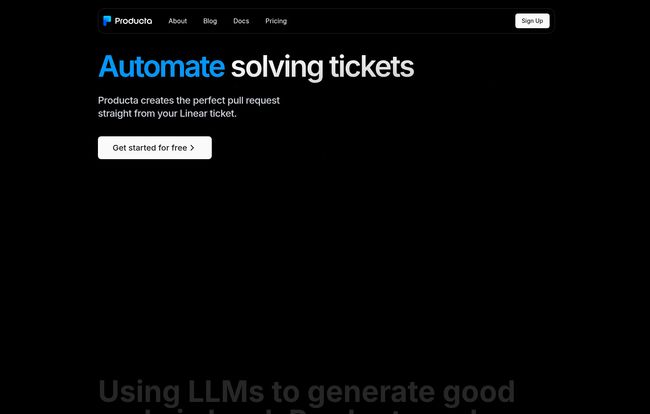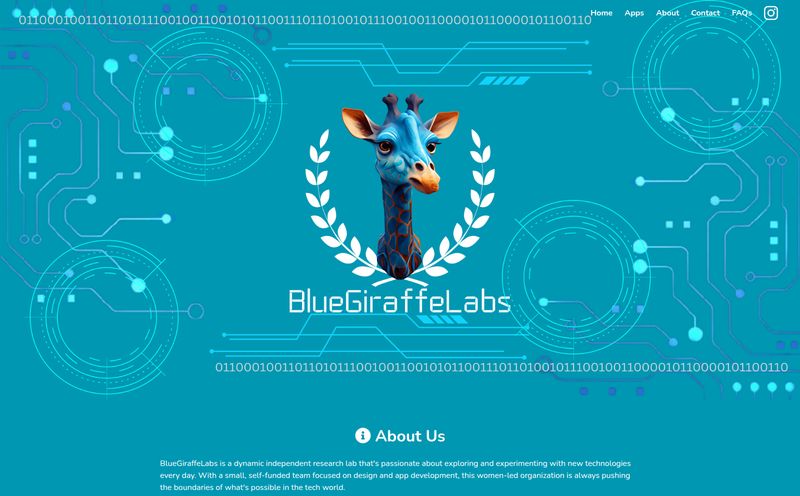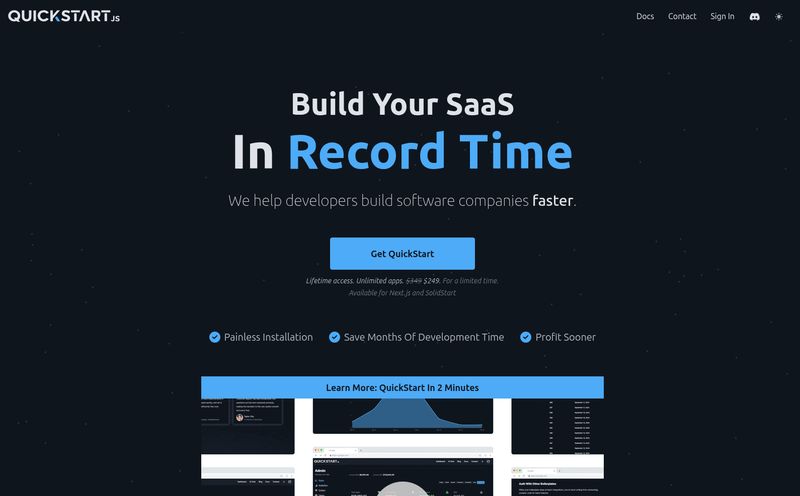It’s that ever-growing list of bugs, tweaks, and “quick” feature requests that somehow multiplies like gremlins after midnight. We’ve all been there. You close two tickets, and three more appear. It’s a Sisyphean task, pushing a boulder of user stories up a hill, only to watch it roll back down.
For a few years now, we've had AI assistants whispering in our ears. Tools like GitHub Copilot have become the de-facto pair programmer for thousands of developers. And they're great! I use them myself. They’re brilliant for boilerplate, for finishing your thoughts, for getting you unstuck on a tricky algorithm. But they're still very much a co-pilot. You’re still flying the plane. They're just handling the radio and making coffee.
Then something like Producta comes along and says, “Hey, why don’t you let me fly a few legs of the journey by myself?” And that, my friends, is a different proposition entirely. This isn’t about code completion; it's about task completion. I had to see what this was all about.
So What is Producta, Really?
Producta pitches itself as an AI-powered issue tracker that directly solves tickets. It's a subtle but massive shift in framing. Instead of helping you write code line-by-line in your IDE, Producta lives one level up, in your project management tool (right now, it seems to be tight with Linear). You don’t ask it to write a function; you assign it a ticket, and it comes back with a full-blown pull request.
Think of it less like a co-pilot and more like a super-intelligent, incredibly fast junior developer. You give it a well-defined task, it goes away, does the work, and then submits its code for your review. This includes validating the task, planning the steps, generating the actual solution, and even testing it. It’s designed to take a whole chunk of work off your team’s plate, not just speed up the typing.

Visit Producta
This is the part that got my attention. Automating the drudgery, the small but time-consuming tickets, so senior devs can focus on big-picture architecture and complex problem-solving? That’s the dream, isn't it?
The Workflow: From Vague Idea to Merged PR
So how does this actually work in practice? It’s not just a black box you yell commands at. The process, from what I've gathered, is pretty structured.
From Notion Scribbles to Technical Tasks
It starts with something we all have: ideas. Producta can help you take a vague concept, like “Improve user profile page,” and refine it into concrete, defined technical tasks. This is often half the battle. By helping you clarify the requirements upfront, it sets the AI (and your human developers) up for success.
Assigning a Ticket to Your New AI Teammate
Once you have a clear ticket in your issue tracker—let’s say, in Linear—you simply assign it to Producta. It’s treated like any other member of the team. The AI then takes over, analyzing the ticket requirements, looking through the relevant parts of your codebase, and formulating a plan of attack. It’s a bit weird at first, assigning a bug fix to a non-human, but you get used to it.
The Pull Request Just Appears
This is the magic moment. After a little while, a pull request pops up in GitHub, linked to the original ticket. It contains the code changes, ready for a human developer to review. And this is the most critical part of the whole thing: a human is still in control. You're not blindly deploying AI-written code to production (please, don't ever do that). You’re reviewing its work, just like you would with any junior dev. You check the logic, test the edge cases, and ensure it meets your standards before you hit that merge button. It’s an automation tool, not an abdication of responsibility.
The Real-World Pros and Annoying Cons
No tool is perfect, especially one this ambitious. After digging in and thinking about how I'd use this on a real project, here’s my breakdown.
The Upside is Potentially Huge
The main advantage is obvious: automating the full cycle for simple tickets could be a massive time-saver. Think about all those low-hanging fruit tasks: fixing a typo in the UI, adding a new tracking event, updating a dependency, fixing a minor CSS bug. These things clog up sprints and distract developers from deeper work. Handing them off to an AI that can knock them out in minutes instead of hours? Yes, please. This could seriously reduce backlog anxiety and improve team velocity. The direct integration is also a big win. No context switching, no copy-pasting into ChatGPT. It just works where you work.
Some Practical Realities and Questions
On the flip side, my cynical, experienced brain immediately goes to the failure points. The quality of the output is entirely dependent on the quality of the input. That’s the old "Garbage In, Garbage Out" principle. If your ticket is vague or your requirements are contradictory, Producta will likely struggle. This might force teams to become better at writing tickets, which honestly, is probably a good thing anyway.
There's also the reliance on AI. What if the generated code introduces a subtle, hard-to-spot security vulnerability? This is why the human review step is non-negotiable. You can’t get lazy. You have to be even more vigilant. Lastly, the website is a bit light on what other issue trackers it supports. It’s all Linear and GitHub right now, but what about the millions of teams on Jira? I'm sure it's on their roadmap, but for now, it seems a bit limited to a specific kind of modern tech stack.
What's This Going to Cost Me? Producta Pricing
Alright, the all-important question: pricing. It's actually pretty straightforward, which I appreciate.
| Plan | Price | Key Features |
|---|---|---|
| Free Trial | $0 / month | One month trial, 1 GitHub repo, 1 Linear project, 5 merged PRs. A perfect way to kick teh tires. |
| Enterprise | Custom | Unlimited everything, 24/7 support, early access to new models (like R1 and o1), private chat. This is for teams ready to fully adopt it. |
The free trial seems incredibly generous and is a no-brainer for any team that fits the Linear/GitHub profile. Five merged pull requests is more than enough to get a real feel for whether this tool provides actual value. The Enterprise plan is, as expected, a “talk to sales” situation. This is standard for B2B SaaS where they need to understand your scale and support needs.
Who Is This For, Anyway?
In my opinion, Producta isn’t for everyone. A solo developer just learning the ropes should probably steer clear. You need to know what good code looks like to effectively review the AI's work.
But for established software teams, especially in fast-moving startups or scale-ups, I see a sweet spot. Teams that have a well-oiled process, write good tickets and are looking for a force multiplier could get a ton of milage out of this. It’s for the team that wants to automate away the noise so they can focus on the signal—the hard problems that create real value.
Conclusion: Your Next Hire Might Be an Algorithm
So, is Producta.ai going to take our jobs? No. Not yet, anyway. What it represents is the next logical step in software development automation. We went from manual compilers, to IDEs, to code completion, to AI pair programmers, and now to AI task-solvers.
Producta is ambitious, and I love that. It's tackling a real, painful problem. It won’t be perfect, and it will require a new way of working and thinking, with an even greater emphasis on clear communication (in tickets) and rigorous review. But the potential to clear out the underbrush of tedious tasks and free up our best minds for bigger challenges is undeniably exciting. If you’re on Linear and GitHub, the free trial is absolutely worth a shot. You might just find your team’s most productive new member.
Frequently Asked Questions
How is Producta different from GitHub Copilot?
Think of it this way: Copilot is a tool for developers to use inside their code editor to write code faster. Producta is a system for teams to use inside their issue tracker to solve entire tickets automatically. Copilot helps you write the email; Producta writes and sends the email for you, then waits for you to approve the next step.
What issue trackers does Producta support?
Currently, all of the documentation and examples point to a deep integration with Linear. While they may support others or have plans to, information is limited. It's best to assume it's Linear-focused for now.
Is the code generated by Producta secure?
This is a critical concern with any AI code generation. The responsibility for security ultimately lies with the human developer reviewing the code. Producta generates a solution, but your team's code review process is the final, essential security gate. You must review its output as carefully as you would any human's.
How much does the Producta Enterprise plan cost?
The Enterprise plan has custom pricing. This typically means the cost is based on your team size, usage volume, and required support level. You'll need to contact their sales team for a demo and a quote tailored to your company.
Can I trust an AI to solve complex feature requests?
I would be very cautious here. Based on the current state of AI, Producta is likely best suited for well-defined, relatively simple tasks like bug fixes, small enhancements, and refactoring. For complex, multi-layered features, a human developer's architectural oversight is still going to be indispensable. Start small and build trust.
Reference and Sources
- Producta Official Website
- Producta Pricing Page
- Linear Project Management
- GitHub
- Forbes Article: How AI Is Reshaping The Software Development Life Cycle



